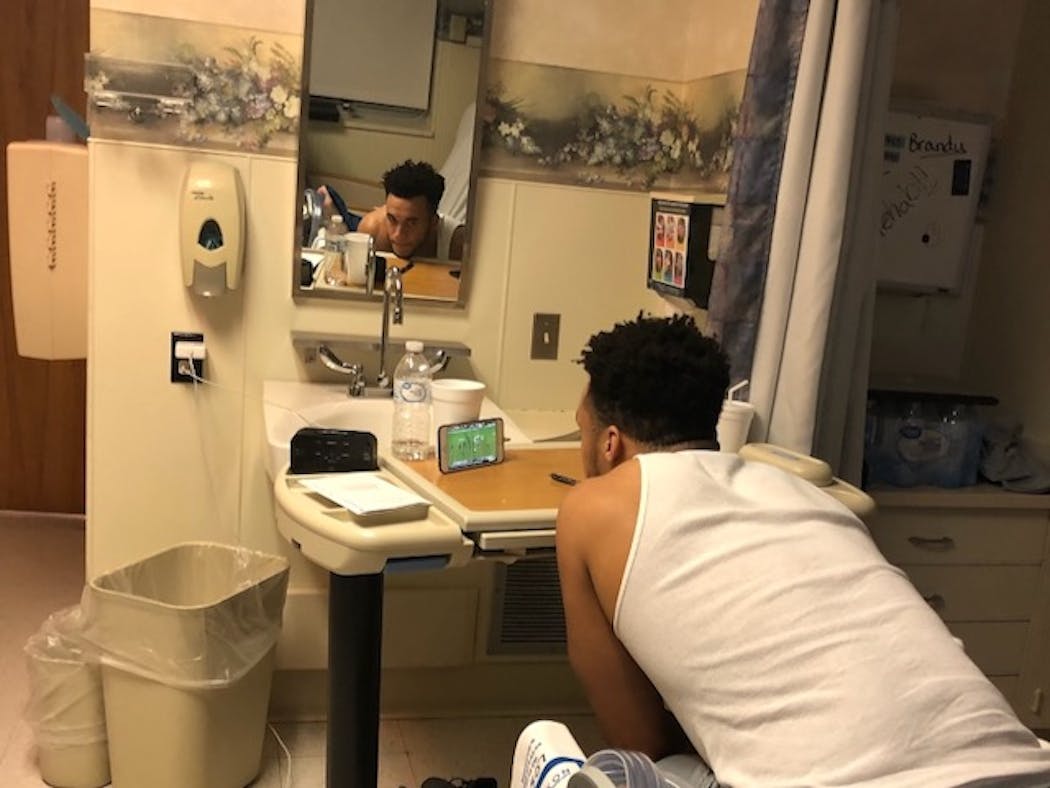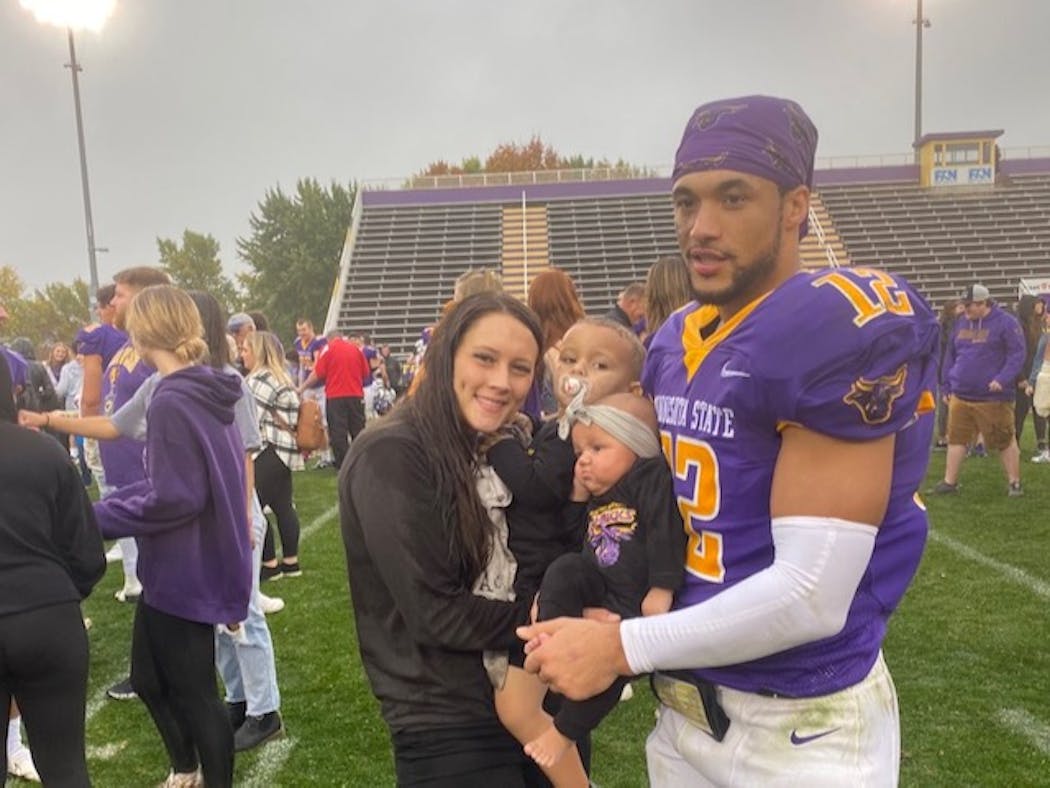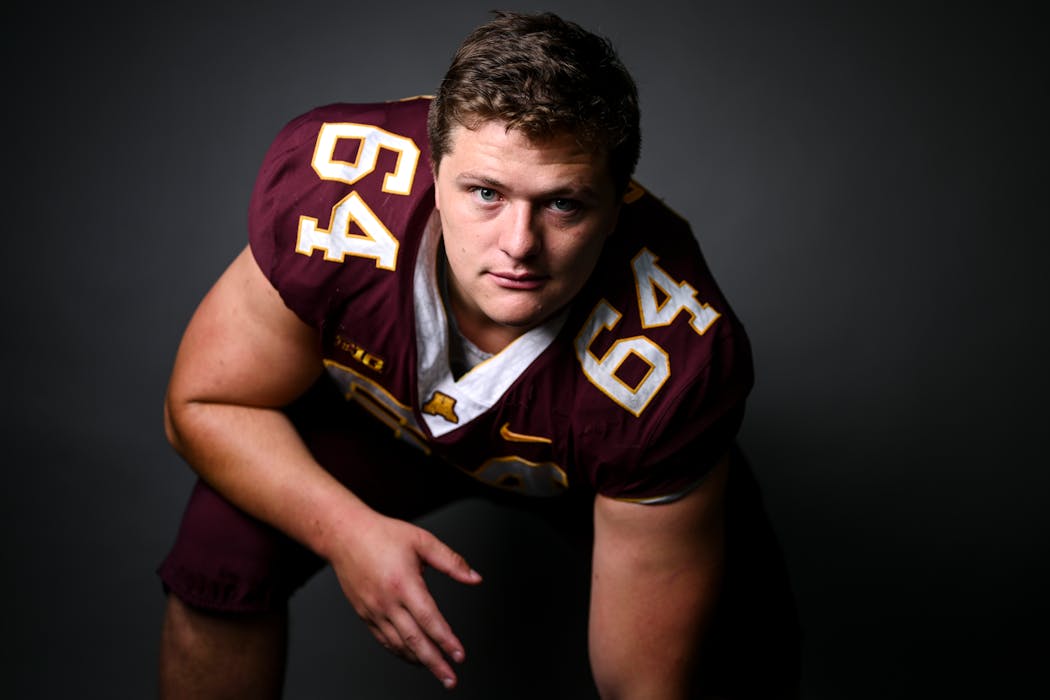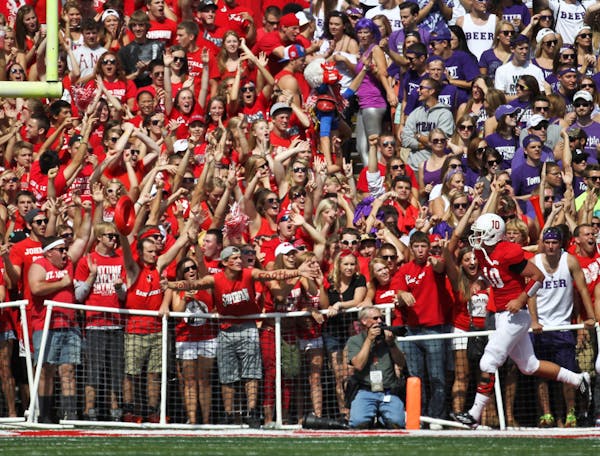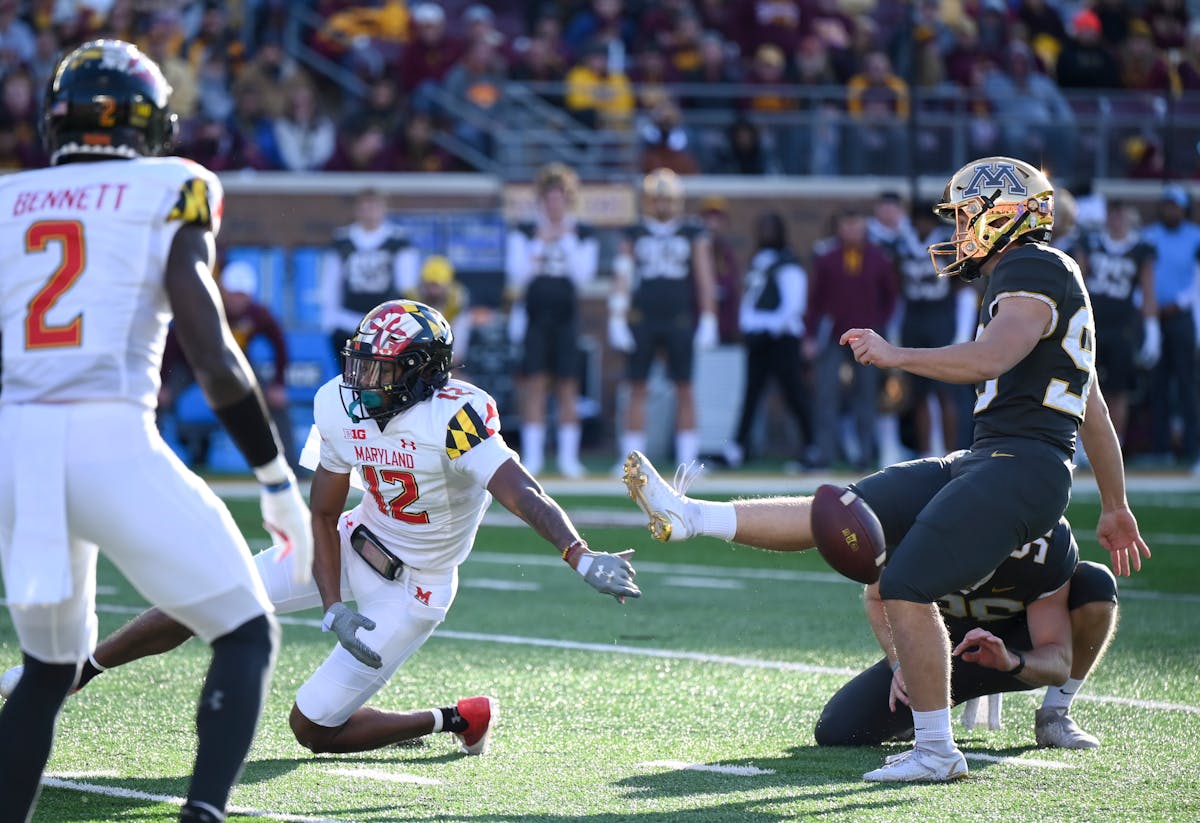Thank you for reading Football Across Minnesota (FAM), my weekly column that tours football topics in our state from preps to pros. You can find all the previous FAM columns right here. — Chip
. . .
Eli Thomas couldn't walk away from football. Not yet. Not until he gave himself one last chance to put on his pads and walk back onto the field, even if the whole idea sounded ludicrous.
Play football? After undergoing three ACL surgeries on the same knee? After suffering a stroke that could have killed him?
Yes, even after all that.
"People say I'm crazy, and maybe I am," he said. "Maybe they're right. When life gives you lemons, I make grape juice."
Thomas chuckled. He never could have imagined his long, hard journey would lead him here, to Mankato, the final stop in a promising football career disrupted by major health challenges.
The 25-year-old New York native and father of two young kids jumped at the only invitation he received to play football again when Minnesota State coach Todd Hoffner offered him a spot on the team.
"This opportunity was too big to pass on," said Thomas, a linebacker who is the Mavericks' second-leading tackler.
To understand his eagerness, one must start at the beginning, back in Elmira, N.Y., where Thomas was a popular star athlete.
He knew he wanted to play college football, but life took a detour when he tore the ACL in his left knee three times — once in track season his senior year, once in junior college, and a third time after he had received a scholarship offer from the University of Connecticut.
Then-UConn coach Randy Edsall did something that floored Thomas and his family. He honored the scholarship commitment even though Thomas hadn't officially joined his program yet. Not only that, UConn handled surgery No. 3 so that team doctors could monitor Thomas' rehab.
"I have nothing but respect for UConn," Thomas said.
He took a redshirt season in 2017, then played in 2018. He suffered a herniated disc in his neck against Syracuse in the fourth game but recovered after a few weeks.
On Oct. 10, Thomas was stretching with teammates before a workout. He felt strange and kept losing his balance. The right side of his body went numb. He remembers a teammate asking him, "Are you good, E?" An athletic trainer quickly grabbed him and started asking questions.
"It was like a movie about my life, but I wasn't in it," he said. "I was in the audience watching it. That's the only way to explain it."
Within minutes, Thomas was inside an ambulance. He had suffered a stroke.
His mother, Mary Beth Turner, received a call at work. Doctors informed her that they had given her son stroke medicine called tPA and requested permission to perform surgery to remove a clot from his brain.
Turner and her son's girlfriend, Katie Snyder, jumped in the car to make the five-hour drive to Hartford, Conn.
"It felt like it was 72 hours," Turner said.
Doctors called back during their drive. They told Turner that surgery was "extremely successful" and praised the fast response by UConn's football medical staff. Elapsed time from onset of the stroke to removal of the clot was only four hours.
"The doctors told us later that had he been anywhere else, he probably would have died," Turner said.
Said Thomas: "They saved my life for sure."
Thomas was unresponsive when his family got to the hospital. He remembers waking up to see them crying. He could not talk at first, then had trouble articulating the right word.
"My thoughts were there, what I wanted to say, but nobody could understand me," he said. "I was getting mad at my family because I thought I was making sense."
Doctors conducted a battery of tests to determine what caused the stroke. They pinpointed a tear in his cerebral artery.
Thomas spent nine days in neuro-ICU, followed by a week in a rehab unit. His brother is married to a speech pathologist, so he moved in with them after being discharged. His sister-in-law gave him daily homework assignments to help regain his speech.
It took three months before Thomas felt comfortable enough to hold a conversation — "That's funny because I love to talk. I will talk your ears off," he said, laughing.
He returned to UConn that January, determined to graduate and to play football again after being named team captain. He checked one box.
He earned his degree, but UConn did not clear him to play. The team doctor told the family that she worried about the risk of concussion after a stroke.
"That crushed me," Thomas said. "It literally felt like my heart was disconnected. Football is a part of me. I've been playing since I was 5 years old. I felt so sick. I couldn't be mad at anybody. It's nobody's fault."
The school and team rallied around him. Thomas received a courage award that was presented by former UConn basketball star Rebecca Lobo. Former NFL All-Pro linebacker Tedy Bruschi, who resumed his career after suffering a stroke, met with Thomas and kept in contact.
Hoping to play again, Thomas put his name in the transfer portal. Several Division I schools showed interest but backed away after learning about his medical history.
"I thought there was no hope," he said.
Hoffner and Minnesota State extended an invitation contingent on him receiving medical approval. Turner said her son received clearance from his primary physician, neurologist, hematologist and cardiologist.
Thomas consulted with Snyder, his longtime girlfriend. They have two children — 2-year-old Ace and 6-month-old Ayla.
Snyder supported his decision to play. So did mom, though not without concern.
"Of course, I worry every day," Turner said. "I also know football has been his love. So I just support him."
Thomas stayed home in New York and took online classes last year after the pandemic cancelled the Mavericks' season. He arrived in Mankato this past spring to finish his masters in sports management and to play football.
He has played in all eight games, the longest stretch in his college career. He said he's never felt stronger physically. He occasionally stutters or struggles to find the exact word he wants to say, but otherwise he has no aftereffects from his stroke.
He hopes to coach football in high school or college after this season.
Thomas received a surprise last week. He learned that the Football Writers Association of America (FWAA) nominated him for its Courage Award. One player throughout college football gets nominated each week. A FWAA panel selects an overall winner at the end of the season, and that player is recognized at the Orange Bowl.
As he sat on a bench outside the locker room last week, Thomas looked across at the Mavericks football stadium. This season has been a gift, he said. A chance to finish what he started.
"I'm just so happy," he said.
. . .
On the road again
Roseau plays a section playoff game at Fergus Falls on Tuesday night, which means the Rams need to be on the road by 11 a.m. at the latest. That ensures them enough time for a nearly four-hour bus ride, plus a pit stop for food and a bathroom break.
Such is life for the team from the northernmost part of Minnesota.
"It's not easy," Roseau coach Matt Heddan said. "It's tough to get them motivated to sit on a bus for four hours."
The Minnesota State High School League replaced the traditional conference model in 2015 with larger districts to help alleviate annual scheduling headaches. The move eased the burden on schools in finding non-conference games.
"My first two years, we had to play some South Dakota teams," said Fairmont coach Mat Mahoney, now in his 15th season.
The switch to districts has been good for most, but not all. Roseau still treks long ways for road games, typically 200 miles, in a school bus that tows a trailer loaded with pads and equipment.
That's seven to eight hours roundtrip on a school bus for most road games.
Roseau faces what other larger outstate schools endure — enrollment too big to play Class 1A opponents. That requires them to travel long distances to find opponents in a larger classification.
"Historically, we're on that bubble," Heddan said. "We're a really small 3A school but a big 2A school. We have a lot of enrollment but participation [in football] has been historically low."
The Rams alternate between 2A and 3A. This season, they are playing 3A.
They caught a break by opening the season at Warroad 22 miles away. Piece of cake. Their other three road games brought more than three hours of driving time one way.
"I know teams don't like coming up to play us," Heddan said. "But they only have one of them usually."
Heddan said teams help accommodate their schedule by moving up the start time an hour early. On game day, the Rams leave in the morning and make one stop.
They typically order pizza for the ride home. They feel lucky if they pull back into Roseau by 1 a.m.
Their cheering section for road games is basically limited to parents — those that can get off work early to make the long drive.
The Rams likely will do this routine five times next season, counting playoffs.
Kudos to players for making that commitment, especially in a tough season such as this one. Roseau is 0-8 entering Tuesday's section game.
Roseau is a hockey community to its core, so developing a football program with strong interest and participation is challenging.
"The kids that come out are pretty tough," Heddan said.
. . .
WEEKEND REWIND
Game balls
- Malik Williams: Bemidji State wide receiver caught 10 passes for 176 yards and three touchdowns to help the Beavers win 42-35, their first victory at Minnesota Duluth since 1941.
- Caden Wheeler: Andover senior rushed for 242 yards and four TDs in a 28-0 win over Cambridge-Isanti. Wheeler finished regular season with 1,106 yards rushing and 18 touchdowns for undefeated Andover.
- Conner Olson: Gophers offensive guard set a school record by making his 52nd consecutive start Saturday against Maryland, an exceptional accomplishment that speaks to both his talent and durability.
. . .
He said what?!
"I'm excited to go watch the tape and see how physical and how dominant it was." — Gophers quarterback Tanner Morgan after his offense ran the ball 56 times, including 23 consecutive runs to end the game, as the offensive line overwhelmed Maryland's defense.
. . .
Numbers to know
- 19.6: Points per game allowed by the Gophers defense, which ranks 26th nationally. The Gophers defense has not allowed less than 20 points per game in a season since 1999.
- 46.7: Rushing attempts per game for the Gophers offense, the seventh-highest mark in FBS, not counting the three service academies.
- 21: Sacks by the Vikings, No. 1 in the NFL, after collecting only 23 all of last season.
. . .
UP NEXT
Grab your popcorn
The 3-3 Vikings return from their bye to host the 5-1 Dallas Cowboys in prime time Sunday night. This begins a difficult four-game stretch that will show how the Vikings measure up against top teams.
. . .
An important 48 hours for …
Mike Zimmer. The Vikings coach is preparing his defense to face the NFL's highest-scoring offense (34.2 points per game) without No. 1 cornerback Patrick Peterson, who is sidelined for three games — at a minimum — because of a hamstring injury.
. . .
A FAM FINAL WORD
"Perseverance"
That word best defines Eli Thomas' arduous football journey. Three ACLs surgeries. A stroke. Three different colleges. A pandemic.
Football demands perseverance of so many who play and coach, and Thomas' story is a remarkable example of someone who refuses to back down from a challenge.
. . .
Thank you for reading Football Across Minnesota. I'll publish this each Monday night on startribune.com, timed to kickoff of "Monday Night Football." And you can also join me on Twitter during the first quarter of MNF as I chat with readers about what I wrote each week.
Thanks,
Chip (@chipscoggins on Twitter)
Scoggins: Why 'championship or bust' fits these Wolves
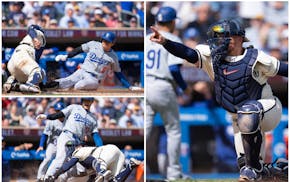
Scoggins: Anatomy of a game-saving play as Correa throws out Ohtani
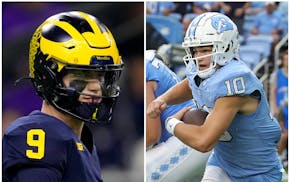
Scoggins: McCarthy or Maye? Ex-U coach breaks down Vikings' options
Scoggins: Cory Provus getting ready for 'biggest challenge' of career


